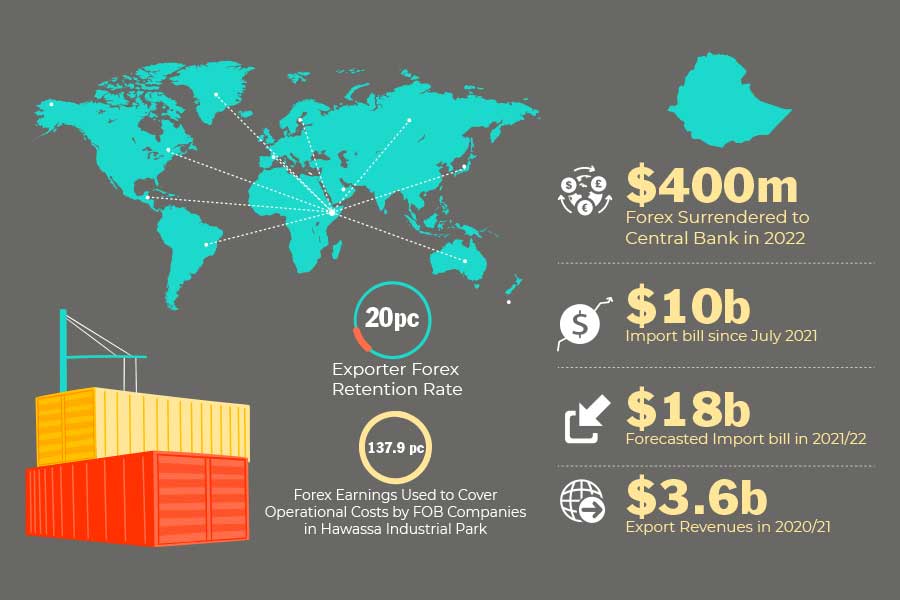
Radar | Apr 30,2021
Exporters have been barreling through from obstacle to disaster over the past decade, not unlike most other sectors. Things have only gotten worse over the last two years, starting from the economic impacts of the COVID-19 pandemic. Now, the headache is coming from the National Bank of Ethiopia (NBE), which recently ordered exporters to surrender four-fifths of all the foreign currency they earn. An overwhelming share goes into the central bank's coffers at 70pc, amounting to 400 million dollars over the past two months. Another 10pc is retained by the commercial banks where the exporters have accounts. Close to 10pc of the forex goes to cover freight costs.

Exporters have misgivings, albeit muted, over the amendment to retention rules, the third in about a year. The consequence, some of them told Fortune, would be to discourage the export business, which is critical to the health of the balance of payments. Moreover, it restricts foreign currency cash flow needed to import essential inputs for production. This is especially the case for exporters in input-intensive industries, such as horticulture and textiles, unable to substitute with domestic supplies due to quality issues. The two sectors earn foreign currency that covers 17pc of the 3.6 billion dollars generated from exports last year. Despite exporters' compunctions, the retention rules are here to stay as the federal government struggles to cover costs for importing essential items such as medicine, fuel, fertiliser and wheat. It also has the burden to settle external debt instalments. Some experts suggest that exporters should be allowed to retain all the hard-earned foreign currency they bring in, benefitting the sector and growing the overall pie through incentivisation. Others advise that exporters consider importing inputs through letters of credit (LC), in addition to the 20pc foreign currency they are allowed to retain. Unfortunately, the queues to obtain permits for letters of credit are too long and could take months or even years before they are approved.
Exporters will have to fend for themselves in the meantime or cease operations. Industry operators warn that they are a few months away from closing up shop.
You can read the full story here
PUBLISHED ON
Mar 05,2022 [ VOL
22 , NO
1140]

Radar | Apr 30,2021

Fortune News | May 29,2021

Covid-19 | Sep 04,2021

Fortune News | Sep 10,2021

Radar | Feb 05,2022

Films Review | Jan 18,2020

Radar | Jul 11,2021

Obituary | May 21,2022

Radar | Dec 19,2021

Fortune News | Oct 23,2021

Dec 22 , 2024 . By TIZITA SHEWAFERAW
Charged with transforming colossal state-owned enterprises into modern and competitiv...

Aug 18 , 2024 . By AKSAH ITALO
Although predictable Yonas Zerihun's job in the ride-hailing service is not immune to...

Jul 28 , 2024 . By TIZITA SHEWAFERAW
Unhabitual, perhaps too many, Samuel Gebreyohannes, 38, used to occasionally enjoy a couple of beers at breakfast. However, he recently swit...

Jul 13 , 2024 . By AKSAH ITALO
Investors who rely on tractors, trucks, and field vehicles for commuting, transporting commodities, and f...

Jun 28 , 2025
Meseret Damtie, the assertive auditor general, has never been shy about naming names...

Jun 21 , 2025
A well-worn adage says, “Budget is not destiny, but it is direction.” Examining t...

Jun 14 , 2025
Yet again, the Horn of Africa is bracing for trouble. A region already frayed by wars...

Jun 7 , 2025
Few promises shine brighter in Addis Abeba than the pledge of a roof for every family...